Amberly Sanchez had a job as an accountant at a real estate company in Albuquerque, New Mexico, when she was laid off due to the pandemic. Then an electrical fire destroyed her apartment building, forcing her and her 16-month-old daughter Avery to stay in a $400-a-week motel. She’d lost everything, from parenting essentials — crib, baby clothes, toy car — to her own mother’s ashes.
This spring, she applied for welfare.
Sanchez, who is 33, expected more than financial assistance from the state — in part because she was distantly aware of the history of welfare reform, a federal law that passed 25 years ago this summer. Given that legislation’s emphasis on putting welfare recipients to work, she said, she thought that welfare officials would push her to get a new job: “In fact, I really hoped they’d help me with that.”
Instead, the New Mexico Human Services Department caseworker who called the next day fixated on an unexpected question: Who was baby Avery’s biological father?
You can’t get public assistance if you don’t name your child’s father, the caseworker said.
“She was really adamant about it,” Sanchez said. “It was all she wanted to talk about: the dad.”
In July, a form arrived in the mail notifying Sanchez that if she wanted a small amount of aid — $357 a month — to help pay her motel bill and replace her possessions, she needed to list her baby’s father’s current and former addresses; his employer’s address; his vehicle’s make, model, year, color and license plate number and the state where it was registered; his bank account number; any real estate or other assets he might have; and the addresses of his mother, father and other relatives and friends. She was also asked to provide, under penalty of perjury, the date she believed she got pregnant and why she believed that to be the correct date.
The state of New Mexico, in accordance with the 1996 welfare reform law, intended to use these details to find the dad and force him to make child support payments — much of which the state would then pocket as reimbursement for providing Sanchez with welfare.
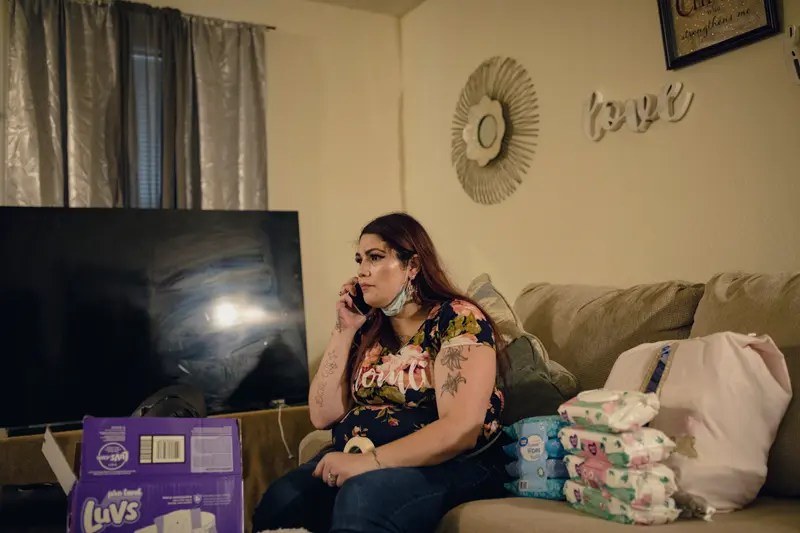
But Sanchez has a fragile co-parenting relationship with Avery’s father that she worries could be torn apart by such a disclosure. He’s been driving into Albuquerque most weekends from outside the city to spend time with their daughter, which is a tentatively positive situation, she said. He is in recovery from a drug addiction, and Avery has started calling him “dada.”
If Sanchez outs him to child support agents, she worries, they could suspend his driver’s license for failing to make timely payments — and he’d no longer be able to visit his family, which she fears might cause him to relapse.
It’s a practice with deep roots in U.S. history: Under the bastardy laws of colonial times, a poor woman who gave birth out of wedlock could be jailed or publicly whipped until she named her baby’s father, or until he came forward to shoulder the cost of raising their child.
More than two centuries later, a similar if less violent legal arrangement was included in the 1996 law that overhauled America’s premier cash assistance program for the poor, which was renamed Temporary Assistance for Needy Families, or TANF. The new law said that in order to get federal anti-poverty funding, states would be required to go after fathers of children whose mothers had applied for welfare, in an attempt to get them to pay child support to the government as repayment for those welfare dollars.
Then-President Bill Clinton said this now much-overlooked provision of the legislation would contribute to “the most sweeping crackdown on deadbeat parents in history.”
To this day, almost every parent who applies for federal welfare assistance (in the large majority of cases it is a single mother, and this story refers to those affected as “mothers”) must first divulge everything she knows about the biological father of her children.
For struggling mothers in New Mexico, a state that often ranks last in the U.S. in child poverty and well-being, this federal requirement means that they must either forgo desperately needed assistance for their children or risk complicating what are often already fraught, and sometimes abusive, relationships with their children’s fathers, if they’re even in contact with them.
It also means that contrary to the popular understanding of child support — that it is intended to go to children — more than $1.7 billion in child support collected from fathers in 2020 was seized by federal and state governments as repayment for mothers and children having been on welfare, according to a ProPublica analysis of federal Office of Child Support Enforcement statistics. Close to 3 million of the nation’s poorest families had child support taken from them last year, amid the pandemic, for this reason. (Most other child support cases are initiated through a divorce or a legal action by the mother; for the majority that don’t involve a mom who has received TANF, the money does go to the kids.)
“It distorts the meaning of child support: You’re asking parents to ‘support their children,’ and then you take the money?” said Vicki Turetsky, who served as the federal child support commissioner during the Obama administration, and who, a mother herself, once received public assistance. “It sours everybody on the purpose of child support, and the purpose of government.”
During the pandemic, the IRS and state child support agencies even redirected stimulus money that had been headed to poor fathers into government coffers instead, on the grounds that they owed child support on behalf of a family that had previously received welfare. A ProPublica analysis of OCSE statistics shows that federal and state governments pocketed roughly $684 million more in child support from these fathers in 2020 than in 2019, which experts said is mostly attributable to the dads’ stimulus checks being intercepted. None of that money went to women and children.
Under the welfare reform law, federal funding for states to spend on assistance for the poor was also frozen at mid-1990s levels, and has not been increased since to account for inflation or changes in population or poverty rates. Yet places like New Mexico, Arizona and Nevada look a lot different today than they did then, with an influx of immigrants and young people nearly doubling the region’s population. The cost of living here has skyrocketed, and with it family need.
Still, funding for welfare remains the same, and as a result, the aid that these Southwestern states can offer per poor child has plummeted.
This fall, as the pandemic and the Biden administration’s stimulus plans have renewed interest in the question of direct cash assistance for the poor, ProPublica will be revisiting the welfare law on its 25th anniversary, investigating states where the diminishing “block grant” of federal funds and changing demographics have resulted in harmful and sometimes bizarre approaches to providing — and then taking back — money for the poor.
More than a dozen mothers in New Mexico spoke to ProPublica about their experiences with cash assistance, as did former Human Services Department lawyers and caseworkers who handled welfare applications. The moms described it as humiliating and sometimes terrifying to be questioned about their sexual histories by agents of the state, in small interview rooms, just to obtain a basic form of government help. Some were required to submit their children to genetic testing in order to receive aid.
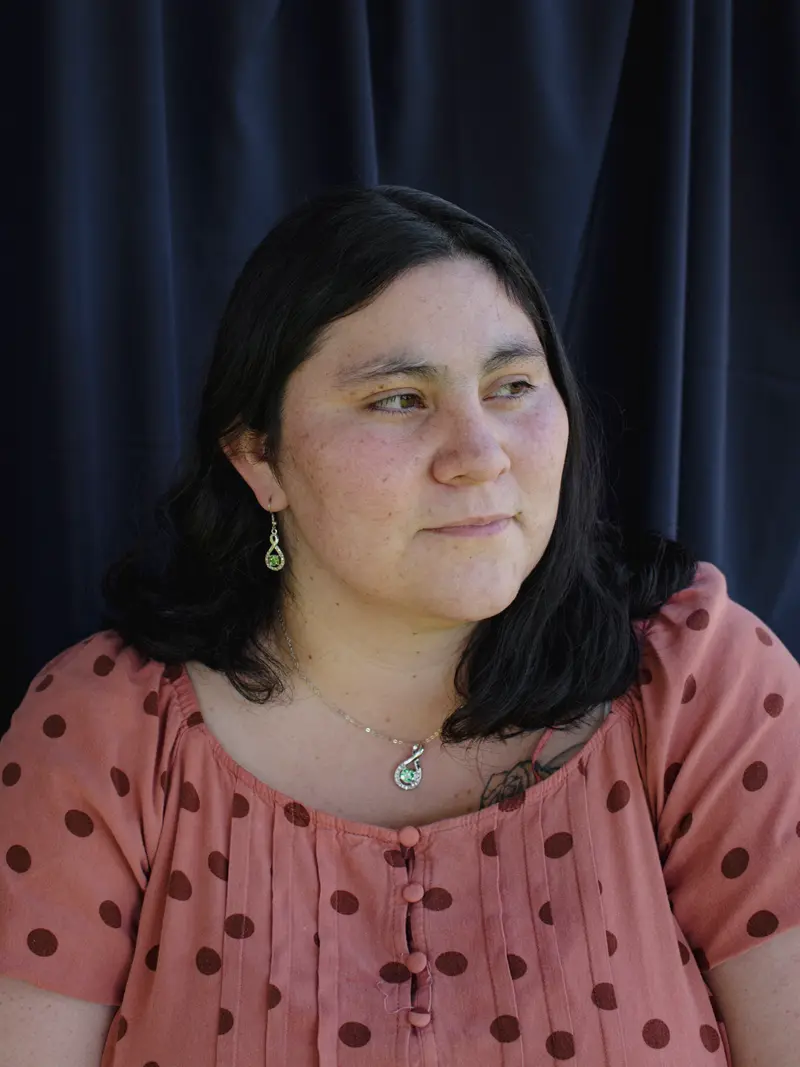
Others fear domestic violence or emotional abuse if they name fathers to the authorities. Caseworkers from multiple states shared instances of mothers saying that dads had threatened to retaliate by killing or kidnapping the mom or her child.
One worker not in New Mexico said in an email that in a recent case, an absent father told a woman applying for public assistance that “if she ever mentions his name on anything, that is the last time she would ever be able to say his name.”
For many mothers, though, the harm is subtler: Fathers may retaliate by withholding informal support, like cash, gifts to the kids or babysitting help. Or a mother may know that her former partner is in a precarious financial situation, and would be ruined by the government garnishing up to 65% of his paycheck — and threatening him with jail time if he can’t or won’t pay up.
In August, the New Mexico Human Services Department cut Sanchez’s monthly benefit from $357 to $268 due to her failure to cooperate with child support, her case documents show; the agency may soon slash the amount to zero.
“And who suffers when benefits are cut? The child,” said Teague González, director of public benefits for the New Mexico Center on Law and Poverty. “That’s money for rent, food and diapers. Children shouldn’t be penalized for what either parent is or isn’t doing.”
Betina McCracken, acting director of the department’s Child Support Enforcement Division, said in an interview that this practice is required by federal law and that the agency takes mothers’ experiences — particularly domestic violence — seriously. Abuse cases are immediately flagged so that caseworkers can handle them with care and confidentiality, and a survivor is allowed to opt out of the child support requirements if she provides a police report or restraining order, or a notarized affidavit attesting to the harm she’d face by naming an abusive father.
McCracken also emphasized that if child support does get set up, it can continue helping the family far beyond the time when the mother is receiving assistance. A child support order should last until a child turns 18, whereas a mom can only get TANF for a few years — because the 1996 welfare reform law allowed states to establish strict time limits for receiving aid.
Also, she said, there can be lasting benefits to children of identifying the father, including a sense of family identity, access to medical history information and Social Security benefits if the dad dies.
As for mothers who complained about how they were questioned by the department, McCracken said that she could imagine how it would feel “if I was in that situation and I had to go in and explain when I had sex, when was the last time, and with whom.” But those details are essential to the task of establishing biological paternity, she said. “We recognize that this is not a comfortable situation.”
Sanchez, after being informed by an advocate about the option to request an exemption from these requirements, submitted forms saying, in part, “I do not want to ruin the relationship by getting child support.” The agency responded weeks later with a notice saying that due to her failure to comply, “Your benefits will be less or stop.”
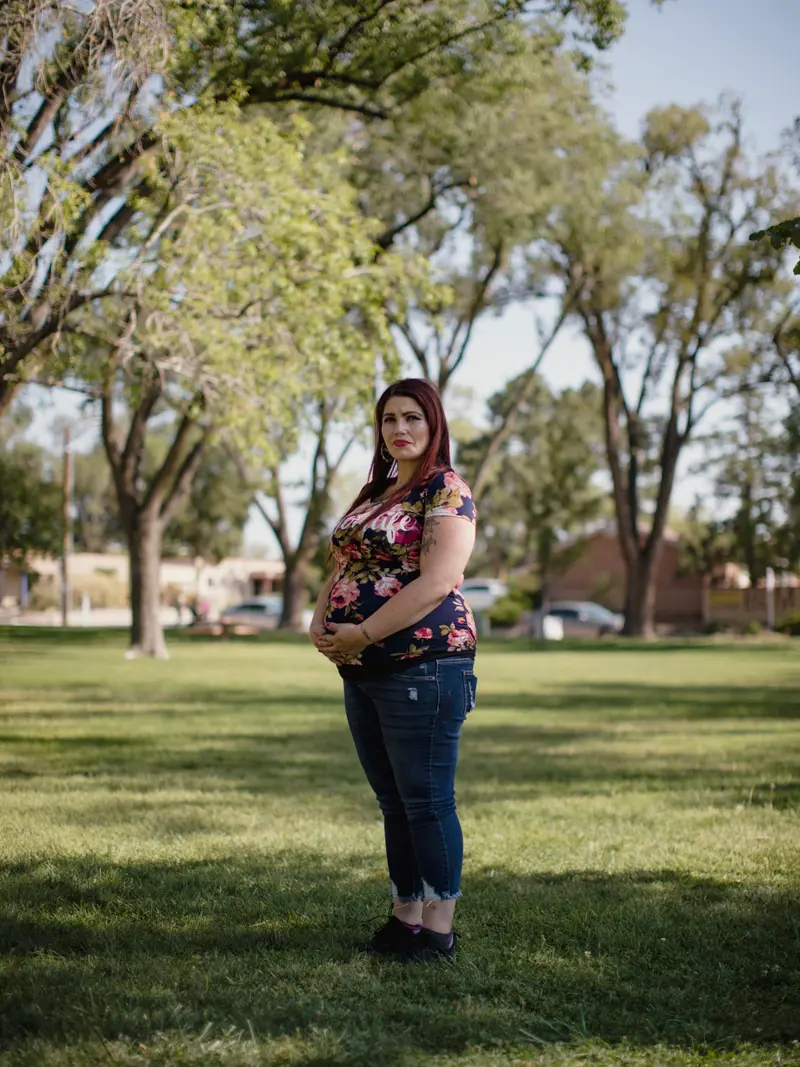
McCracken said that subjective reasons that a mother might not want to cooperate with child support in order to receive assistance — short of domestic violence or other risk of severe physical or emotional harm to her or her child — are not legally valid. Sanchez’s concerns about the process crushing her fragile family dynamic, for instance, do not meet the standard for opting out, McCracken said.
The practice of confiscating child support payments from the poor persists in part because some policymakers believe that welfare should be considered a loan, to be repaid by the patriarch of the family.
“Legislators suggest to me that if a family gets both TANF and child support, they’re ‘double-dipping,’” said Jim Fleming, president of the National Council of Child Support Directors and president-elect of the National Child Support Enforcement Association. (He noted that he was not speaking on behalf of either organization.) “That argument is still out there,” Fleming said, though it is “becoming more and more of a minority view.”
The practice has also survived because the government benefits from it financially. Child support obtained from these families is a critical source of revenue for many states and counties, said Fleming, who is also North Dakota’s child support director. That point was echoed in interviews with other state child support officials.
But amid the pandemic, many politicians are reimagining the American social safety net: From stimulus checks to child tax credits, the trendy, research-based approach has been to get cash straight to families in need with no strings attached.
In Congress, a pair of Democratic senators are set to introduce a bill this fall that would ban states and the federal government from pocketing child support as “cost recovery” for welfare. The legislation contains some additional federal funding so that state agencies can implement the change without cutting their budgets; in part to win Republican votes, it also includes grants for healthy marriage and responsible fatherhood programs.
“I think there’s the potential for bipartisan support,” said Sen. Chris Van Hollen of Maryland, who will introduce the bill along with Sen. Ron Wyden of Oregon and Illinois Rep. Danny Davis in the House of Representatives. “The focus of the current system is on collecting money for the government, rather than on strengthening families — which should be our shared goal.”
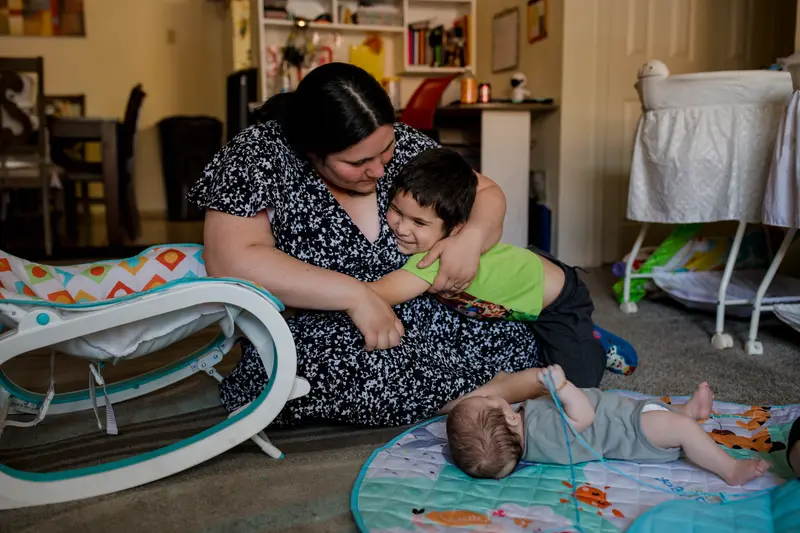
Less Money to Aid the Poor, but Greater Latitude Over Its Use
The Southwest has been a case study in why welfare should not have been turned into a block grant, experts say.
Nevada, for instance, saw a greater increase in numbers of poor children from 1997 to 2015 than any other state, and Arizona wasn’t far behind; at the same time, those states’ federal aid funds per poor child declined in value by more than 50% due to inflation and demographic changes, according to the Center on Budget and Policy Priorities.
As a tradeoff for providing states like these with a set amount of funding that would decline in value over time, the Clinton administration promised each state more flexibility over how it could use the dollars, unburdened by federal regulation. The implication was that with greater discretion as to how to address poverty, states would innovate and find ways to do more with less.
But the opposite has been true. Because of their shrinking blocks of funding, states have cut benefit amounts for the poor and set short time limits for receiving assistance. And with their greater flexibility, they have spent the federal money on programs unrelated to direct aid to poor mothers and children — or have asked equally poor fathers to pay the government back.
The practice of taking child support money from these families already existed, but prior to 1996 states had been required to send at least $50 a month of a child support payment to the family before diverting any of it into government coffers. The welfare reform law also allowed states to cut off all aid to mothers, not just a portion, for failure to cooperate with child support. (At least 14 states reduce families’ benefits by a smaller percentage, often 25%, for child support noncompliance; New Mexico is among the majority that will cut the whole amount in some cases.)
Many low-income moms in New Mexico said they lasted just a few months receiving aid because of how often their benefits were cut for not responding quickly enough to a child support mailing or for not taking off work to attend a child support interview.
In August, 1,974 families receiving TANF in the state were sanctioned — meaning their benefits were reduced or ended — for a failure to comply with what child support officials were asking of them, out of a total of roughly 12,000 cases statewide. That means about one in six mothers and children were financially penalized under the child support rules in just one month.
Especially during the pandemic, the TANF program has failed families in part “because of how they sanction you for this really personal thing,” said Micaela Baca, who grew up in foster care and now supports her children in Albuquerque by working 16 hours a day, six days a week, as an in-home caregiver and at a nursing home. Welfare, she added, “could really make our state and our community better, and help bring someone like me up out of poverty. But it’s just not doing that.”
Janel Ahle is pursuing a biomedical engineering master’s degree at the University of New Mexico; she has also studied evolutionary anthropology, Russian and psychology, she said. With her busy academic schedule, she hoped for some help paying for child care and other parenting needs for her children. But she gave up on applying for public assistance because, she said, “I didn’t want to go through with the child support process, because I saw it as the guy who had never been there getting more rights in the matter.”
This was another common fear articulated by mothers who were asked to name fathers to get aid: that an absent dad forced to pay support would spitefully seek custody or greater involvement in medical and educational decisions about the child.

Karmela Martinez, director of the New Mexico Human Services Department’s Income Support Division, which administers TANF, said in an interview that the sanctions imposed on poor mothers for not cooperating with child support are mandated under a New Mexico statute that was enacted in compliance with the 1996 welfare reform law. Any change to the sanctions system would have to be made by the state Legislature, she said.
Martinez also said that the Child Support Enforcement Division is the part of the department responsible for deeming mothers compliant or not, and that once they are found to be noncompliant, sanctions go into effect automatically according to a computer system. In other words, she said, it’s not up to individual Income Support Division caseworkers making subjective decisions to punish moms.
New Mexico does pass roughly half of the average monthly child support payment to kids in TANF cases, according to statistics provided by the department, though it keeps the rest. Some states, including nearby Arizona and Nevada, seize 100% of the money.
New Mexico stands out, though, in part because this practice harms an especially vulnerable population there: It has some of the highest levels of child poverty in the developed world.
It’s also a contentious moment politically for the issue in that state. According to interviews with mothers, state caseworkers and policy experts, New Mexico stiffened its rules for cash assistance under the governorship of Susana Martinez, a Republican who made deep cuts to social programs. But that strict enforcement has largely continued since Gov. Michelle Lujan Grisham, a Democrat who promised in 2019 that she would end child hunger statewide, took office. (Both houses of the Legislature are also controlled by Democrats.)
Angelica Rubio, a state representative, has raised the child support issue with the Human Services Department in private meetings, according to interviews with those who were present. But Rubio told ProPublica that there didn’t “seem to be much sense of urgency,” and that the conversations were “pretty rushed and felt like a non-priority.”
The department earlier this month did request $1.7 million in additional funding from the Legislature to fill the budget shortfall that it said would result if it sent more child support payments to families instead of intercepting the money, a reform that Gov. Lujan Grisham’s office said she supports. But McCracken, the acting child support director, said agency officials are still looking at their options and cannot, for fiscal reasons, go so far as to let all child support flow to mothers and children.
There’s also no guarantee that the request for more funds will be approved; the Legislature will be considering the new budget until January.
Tripp Stelnicki, director of communications for Gov. Lujan Grisham, said in an email that the administration “gets important benefits to families throughout New Mexico without excessive sanctions, restrictions and requirements every single day.” He also pointed out that the governor recently worked to pass legislation modernizing the state’s child support system with the goal of getting more money to children.

Child Support Program Began After Welfare Was Extended to Women of Color
Race has always colored the relationship between welfare and child support.
In the early 1900s, state and local cash assistance for single mothers — often called a “mother’s pension” — was available mostly to widowed white women, not to Black women or unwed moms. As the welfare rolls diversified in the 1940s, ’50s and ’60s, many states adopted “man in the house” mandates, which cut aid to women if a man lived in their home who was not their children’s father; these were enforced far more often against Black mothers.
In 1975, the federal child support program was founded with the explicit purpose of getting fathers to repay the government for public assistance that mothers had received.
“It’s not a coincidence that child support was federalized in the decade after the civil rights movement — in other words, in the decade after all these public goods, including welfare, had started being expanded to Black women,” said Daniel L. Hatcher, an expert on poverty at the University of Baltimore School of Law. “We don’t force middle-class or wealthier single women who have received government services, or tax breaks of one sort or another, to pursue child support against the dad if they don’t want to.”
Curshelle Vann, another mother in Albuquerque, said the government “demeans you” about going after child support to repay welfare, especially if you’re Black, Hispanic or Native American.
“I didn’t think they’d be so nasty about the father,” said Vann, who is Black. “If I don’t know where he works or any of that, they shouldn’t cut off money for my children.”
The stigma around the sexual choices of single moms remains pervasive at the welfare office, said Georgette Cooke, who said she doesn’t know who the father of her child is. “Look, it was a one-night stand. I didn’t know I would get pregnant,” she said. “But I’m still the one who has to support my child.”

Cooke said she considered lying to New Mexico officials, telling them the dad was “Tom Cruise or something.”
She said the state cut off all of her assistance — money she was using for diapers and wipes — for not cooperating with officials in their attempts to name the father.
McCracken, the child support director, said that not knowing the identity of the dad is not a good-cause reason for not cooperating with child support, though as long as the mom keeps communicating with child support agents while they search for him, they may stop requiring her participation after six months or a year if he cannot be found.
Robert Doar, president of the American Enterprise Institute, a conservative think tank, was the head of New York state’s child support program when federal welfare reform was passed. He noted that due to the 1996 law’s strong work requirements and the resulting narrowing of cash assistance, TANF has become such a small program that the child support issue affects far fewer mothers and children than it used to.
“Maybe this practice ought to be put out of its misery,” he said, but he added that there remains a legitimate rationale for it: “When a parent needs help from the government because the other parent is not supporting them ... it’s perfectly logical to say to that absent parent, ‘Hey, wait a minute, you ought to pay us back.’”
Doar said that requiring mothers to comply with child support, even against their will, can be beneficial for them in the long run. It sets them up to keep getting child support even after their welfare is repaid to the government, and without having to navigate the labyrinthine family court system on their own, including paying a lawyer and court fees.
Yet attitudes around cash assistance among many child support officials continue to evolve.
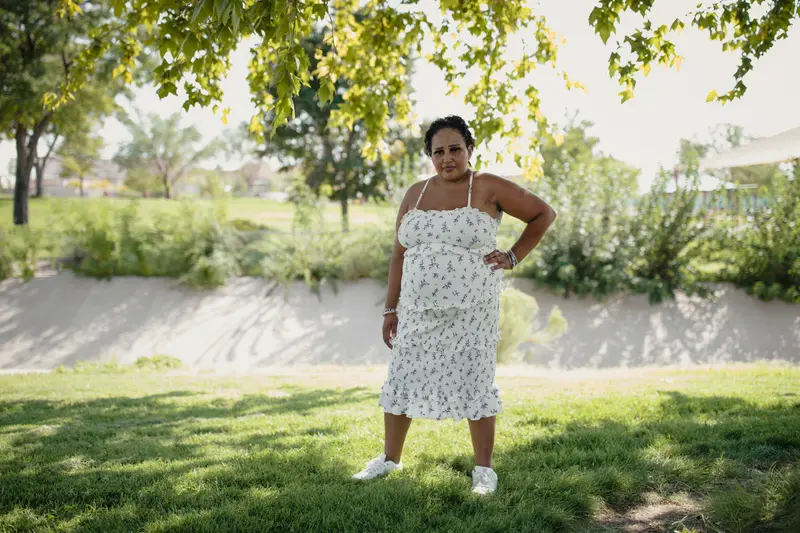
In 2017, another of New Mexico’s neighbors, Colorado, implemented a new law that allows all monthly child support payments made by fathers to be “passed through” directly to their kids, without being intercepted by the government.
The results have been clear. When dads know their money will make it to their children, they pay more, they pay more often, and they pay through the official child support system, rather than sending the moms cash whenever they happen to have some, research shows. They have also been shown to be more likely to keep their jobs instead of working in the underground economy and more likely to formally acknowledge paternity of their children.
In the first two years after the Colorado law was enacted, poor families in the state received $11.7 million more in child support, and monthly collections jumped by 76% in current TANF cases. Colorado counties, initially resistant to the policy change because they thought it would put a dent in their budgets, now support it because more dads are cooperating with them, said the state’s child support director, Larry Desbien.
Research also makes clear that allowing child support to flow to families makes low-income mothers more likely to work, because they can afford child care. And every dollar that goes to moms and kids saves the government many times more in the future, when they will be less likely to rely on social programs like food stamps and Medicaid.
Finally, several experts said, going after child support to recoup welfare is only marginally cost-effective for the government. That’s in part because fathers in TANF cases are so often poor themselves, and pursuing payment can require tracking them down, taking them to court or jailing them at taxpayers’ expense.
Yet the New Mexico Human Services Department and many others across the country continue pressuring poor single mothers to sign over their child support rights to the state to keep that trickle of revenue flowing.
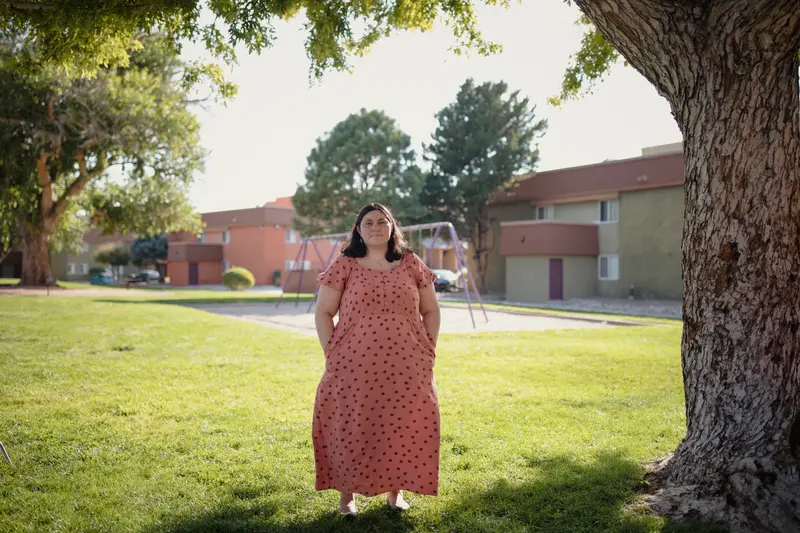
When Albuquerque resident Alyssa Davis applied for public assistance for herself and her baby boy, Zeppelin, she didn’t expect to be hassled about child support requirements because she was in a committed relationship with the father. (They are now married.)
She said her interactions with the Human Services Department started out friendly but turned contentious when she mentioned that the dad was not, in fact, a deadbeat. “They didn’t take too kind to that,” Davis said. She said that a caseworker tried to get her to say that the father wasn’t as involved a parent as she was claiming, so that the state could go after him for child support as repayment for providing her with assistance.
“It’s like they wanted us to not be a family unit,” she said, “which I thought was the opposite of what this whole welfare thing was supposed to be about.”
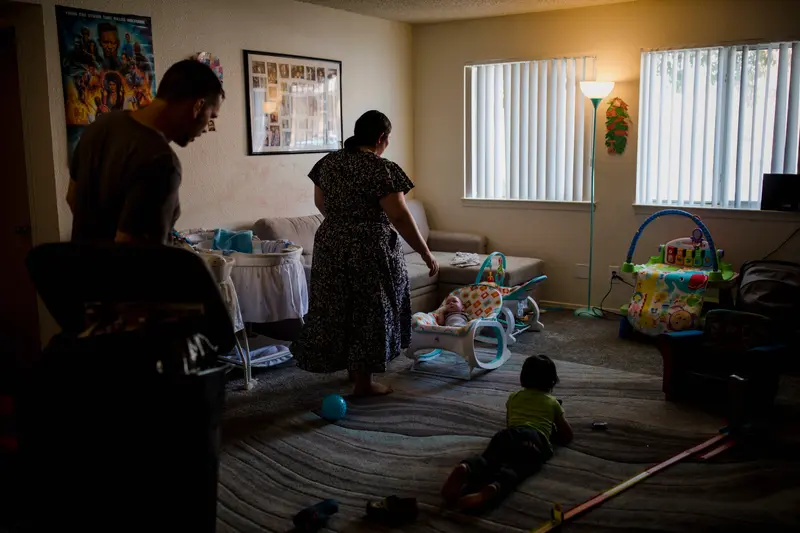
Mollie Simon contributed research.






